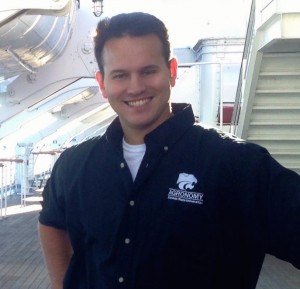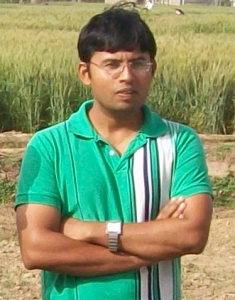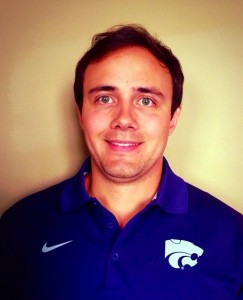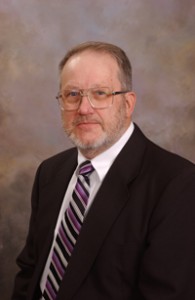New Faculty
Dr. Ray Asebedo

Dr. Ray Asebedo is the new assistant professor of precision agriculture, as of May 2015. Asebedo is a native of Kansas, home grown in the Flint Hills. He received his B.S. degree in Agronomy from Kansas State University. He completed his Ph.D. in Agronomy from Kansas State University in 2015, where his research focused on developing nitrogen recommendation algorithms utilizing remote sensing technologies for winter wheat, corn, and grain sorghum.
Dr. Asebedo believes that precision agriculture is a system that integrates multiple disciplines, such as entomology, plant pathology, crop science, soil science, and engineering. Therefore, the precision agronomist is the integrator of all these disciplines to provide site-specific recommendations that optimize profit per acre and reduce environmental impact – with the goal of improving the sustainability of crop production.
Dr. Asebedo’s research program will focus on developing precision farming systems that integrate technologies such as crop and soil sensors from ground platforms, sUAS, and satellites to provide effective precision agronomic systems to farmers.
His teaching program will focus on training the next generation of agronomists to think outside the box and be leaders in agriculture, advocating multi-disciplinary collaboration to create a sustainable future.
Typically, Dr. Asebedo says he does not really ever clock out from work. However, he is dedicated to his family and strives to pass on his love the land and agriculture to his two daughters. Asebedo can be reached at 785-410-7172 or by email at ara4747@ksu.edu. Also follow him on Twitter @KSUPrecisionAg.
*****
Dr. A.J. Foster

Dr. A.J. Foster is the new Southwest Area Extension Crops and Soils Specialist, as of August 17, 2015. Foster was most recently the Regional Agronomy Specialist with the University of Missouri’s Southeast Region, commonly known as the Bootheel.
Dr. Foster is a native of Linstead, Jamaica. He earned an associates degree from the College of Agriculture, Science and Education in Portland, Jamaica and a diploma in secondary education from the University of the West Indies. He was then awarded a scholarship by Alcan Aluminum Corporation to attend Louisiana State University (LSU) to continue his education. He received his B.S. degree in environmental management from LSU. He has M.S. degrees in agronomy from Mississippi State University and in agronomy/soil chemistry from LSU.
He received his Ph.D. in crop science from Oklahoma State University in 2013, where his research focused on remote sensing application in bioenergy crop production system.
His goal as Southwest Area Crops and Soils Specialist will be to provide leadership for Extension educational programs in crops, soils, weeds, forage, and rangelands in southwest Kansas. Dr. Foster’s main area of expertise is soil fertility, but he also has interests in cropping systems management in different environments.
Outside of work, Dr. Foster has a love for soccer. He has taught soccer, and follows the sport closely. He also enjoys spending time with his wife, college football, St. Louis Cardinals baseball, and reading. Dr. Foster may be reached at 620-275-9164 or by e-mail at anserdj@ksu.edu.
*****
Dr. Krishna Jagadish

Krishna Jagadish is the new Associate Professor for Crop Physiology. He received his Ph.D. from the University of Reading UK, mainly focusing on reproductive stage heat stress physiology in rice. Before joining K-State, he completed a three-year post-doctoral fellowship at the International Rice Research Institute and served the institute as Scientist II, leading the institute’s heat and drought stress physiology research and was also the Deputy Division Head of the Crops and Environmental Sciences Division.
His major research interests are understanding mechanistic responses of field crops to pre and post flowering heat, drought or combined abiotic stresses, to identify traits/mechanisms to induce greater stress resilience towards maintaining grain number, grain weight and quality.
In his new role he will be addressing these issues at different spatial scales — high-controlled environments, semi-controlled field-based facilities, and open-field conditions — to connect novel traits/mechanisms from identification to product development/application. He aims to work very closely with the wheat, sorghum, and soybean breeders, agronomists and other key disciplines to help improve abiotic stress tolerance among popular Kansas cultivars and accessions that are of global importance.
Dr. Jagadish can be reached at 785-706-3263 or by email at kjagadish@ksu.edu.
*****
Dr. Romulo Lollato

Dr. Romulo Lollato is the new Wheat and Forages Extension Specialist, starting August 3, 2015. Lollato received his Ph.D. from Oklahoma State University in July 2015, where he worked under Jeff Edwards, the former OSU Small Grains Extension Specialist.
Dr. Lollato is originally from southern Brazil, where he received his B.S. in Agronomy from Londrina State University in 2009. After working for a year for the private sector, Dr. Lollato came to the U.S. in August 2010 to work toward his M.S. in Plant and Soil Sciences at OSU, focusing his research on strategies to ameliorate acidic soils for wheat production.
He received his Ph.D. from Oklahoma State University in July 2015, where his research focused on a mix of field work and modeling with the goal of estimating maximum attainable wheat yields in the southern Great Plains.
Dr. Lollato’s goal as the new Wheat and Forages Extension Specialist is to have an applied research program that focuses on actual problems wheat producers face throughout Kansas, so he can support his Extension program with valuable applied research information that directly affects Kansas wheat producers’ productivity and profitability. He intends to reach Kansas producers using traditional field days, Agronomy eUpdate articles, crop schools, news releases and Extension publications; as well as sending out information on Twitter, Facebook, and through the K-State Extension Wheat webpage.
Dr. Lollato can be reached at (785) 532-0397 or by email at lollato@ksu.edu. Also, follow Lollato on Twitter at @KSUWheat.
Retirements
Dr. Loyd Stone

Dr. Loyd Stone, professor emeritus of agronomy, retired in January 2015 after more than 41 years of dedicated service to the Department of Agronomy, College of Agriculture, Kansas State University, and the agricultural community of the state of Kansas.
Dr. Stone received his B.S. degree in Agronomy from Oklahoma State University in 1967. He then earned his Master’s degree in Soil Physics in 1969 from Oklahoma State University and his PhD in Soil Physics in 1973 from South Dakota State University.
Dr. Stone’s career at Kansas State University began in 1973 as assistant professor of Agronomy. In 1978 he became associate professor, then full professor of agronomy at K-State in 1983. He has served in that capacity since that time.
Dr. Stone’s work at Kansas State University focused on the improvement of water use efficiency in Kansas’ crop production systems. His research has encompassed the spectrum of water use issues faced by Kansas producers, including:
- Drainage losses from soil profiles
- Yield response to limited irrigation
- Crop yield vs. evapotranspiration (ET)
- Modeling of soil-water-crop systems
- Decision-support software for irrigation management
- Soil physical properties with direct impact on water use efficiency
Perhaps his most fundamental achievement was the development of the Kansas Water Budget, a water balance model developed by him and his colleagues in the mid-1990’s. The Kansas Water Budget has been the underlying basis for subsequent irrigation management software, with the Crop Water Allocator and Crop Yield Predictor software packages from K-State used by researchers, Extension, irrigators, and crop advisors since that time. In recognition of the far-reaching practical value of this research, Dr. Stone received the Educational Aids Blue Ribbon Award from the American Society of Agricultural and Biological Engineers.
His expertise has been acknowledged by the U.S. Supreme Court in the case of Kansas v. Colorado. Dr. Stone provided key analysis for determining the value of lost profits by producers in Kansas from the water withheld by Colorado. His analysis was accepted by the master for the Supreme Court, and as a result Kansas was awarded a total of $35 million in that case. He received a letter of recognition from the Kansas attorney general for his service.
In addition to research that has benefitted agriculture in Kansas, Dr. Stone was also valued as a teacher and advisor during his tenure at K-State. He received the Outstanding Mentor award from K-State Research and Extension in 2009; Advisor of the Year Award in 2006-07 from the College of Agriculture; and the Distinguished Faculty Award from Gamma Sigma Delta at K-State in 2004. He was selected as Fellow of the American Society of Agronomy in 1999. He published 40 papers in the ASA-CSSA-SSSA professional societies publications during his career.